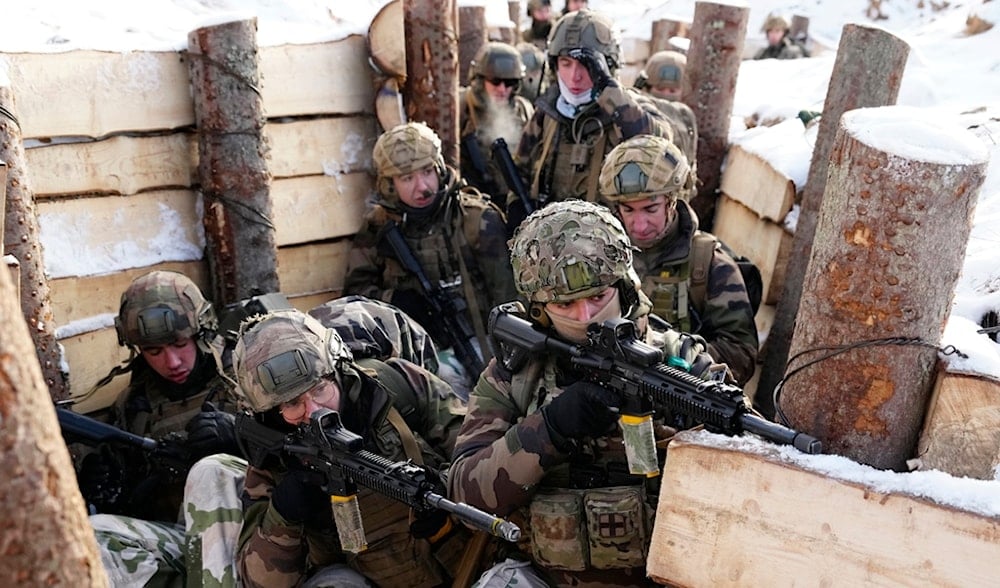UK, France seek European role in Ukraine ceasefire by troop deployment
Britain and France are exploring options to deploy troops to Ukraine to monitor a potential ceasefire, while reaffirming their stance against direct combat involvement.
-

rench soldiers attend the Winter Camp 23 military drills near Tapa, Estonia, Sunday, Feb. 5, 2023. (AP)
Britain and France are reportedly in confidential talks, according to a report by Mirror, to explore the potential deployment of their troops to Ukraine as part of a ceasefire monitoring initiative. According to a senior NATO official cited in the report, these discussions are being held in London and Paris, "not at the NATO level."
One proposed scenario involves "an Anglo-French contingent patrolling the contact line between Ukraine and Russia in order to monitor a ceasefire that may be achieved as a result of peace talks."
The cited official noted that such preparations aim to ensure European involvement in mediation efforts that US President-elect Donald Trump could lead.
French Foreign Minister Jean-Noel Barrot stated that Paris is not ruling out troop deployment, while former UK Prime Minister Boris Johnson suggested that a multinational European force could help monitor the Russia-Ukraine border for an "end state" while rejecting the notion of troop deployment.
However, the report stressed, UK Foreign Secretary David Lammy reiterated Britain’s stance against deploying combat troops to the conflict zone, emphasizing continued support through training instead. "We are very clear that we stand ready and continue to support the Ukrainians with training particularly, but there has been a long-standing position that we are not committing UK troops to the theatre of action," Lammy said.
NATO chief cautions Trump over Ukraine deal in Russia's favor: FT
The United States would face a "grave threat" posed by China, Iran, and the DPRK if Ukraine accepts a peace deal favorable to Russia, NATO’s newly appointed Secretary-General Mark Rutte warned President-elect Donald Trump.
In an interview for the Financial Times, Rutte emphasized the growing dangers stemming from closer cooperation among US adversaries, urging Trump to remain committed to NATO and continue supporting Ukraine.
Rutte highlighted the peril of Russia allegedly transferring missile technology to the DPRK and financial support to Iran. Referring indirectly to Taiwan, he warned that Chinese President Xi Jinping “might get thoughts about something else in the future if there is not a good deal [for Ukraine]."
"We cannot have a situation where we have [DPRK leader] Kim Jong Un and the Russian leader and Xi Jinping and Iran high-fiving because we came to a deal which is not good for Ukraine, because long-term that will be a dire security threat not only to Europe but also to the US," he told the Financial Times in his first interview as NATO’s leader.
The former Prime Minister of the Netherlands revealed he had conveyed this message to Trump during their November 22 meeting in Florida, as part of an effort to convince the President-elect to maintain US engagement with NATO allies and ongoing support for Ukraine.
"Look at the missile technology which is now being sent from Russia into North Korea, which is posing a dire threat not only to South Korea, Japan, but also to the US mainland," Rutte said he informed Trump.
"Iran is getting money from Russia in return for, for example, missiles, but also drone technology. And the money is being used to prop up Hizbollah and Hamas, but also steering conflict beyond the region," he claimed.
During his campaign, Trump pledged to end the war in Ukraine within "24 hours" and has nominated former General Keith Kellogg as his special envoy for Ukraine and Russia. Kellogg has advocated for freezing the current battle lines and pressuring Kiev and Moscow to negotiate.
Rutte, who assumed office in October, brings a proven record of working effectively with Trump during his first presidency. As the former Dutch prime minister, he played a key role in securing increased NATO defense spending in 2018, averting a potential withdrawal of US support from the alliance.
Rutte is set to chair a NATO foreign ministers meeting in Brussels on Tuesday, where Ukraine’s Foreign Minister has called for a formal invitation to join the alliance. However, the US and Germany have resisted immediate membership discussions.
The Secretary-General stressed that bolstering military aid to Ukrainian President Volodymyr Zelensky is currently more critical than deliberating on NATO membership timelines.
"The most important thing now is to make sure that whenever Zelenskyy decides to get into peace talks, that he can do this from a position of strength," he indicated.
"That for me is now priority number one."
Read more: Kiev demands clarity on NATO membership path

 5 Min Read
5 Min Read











